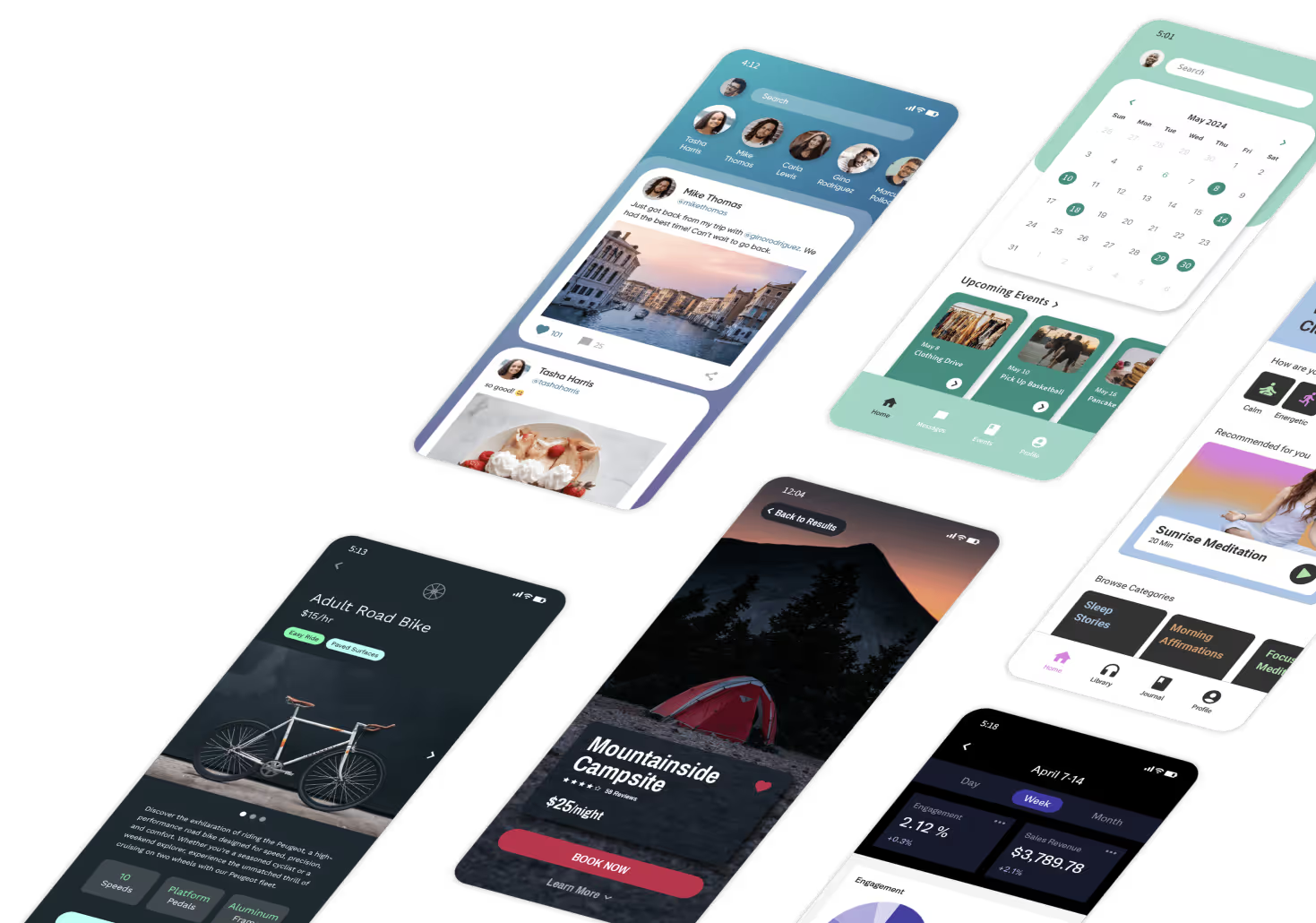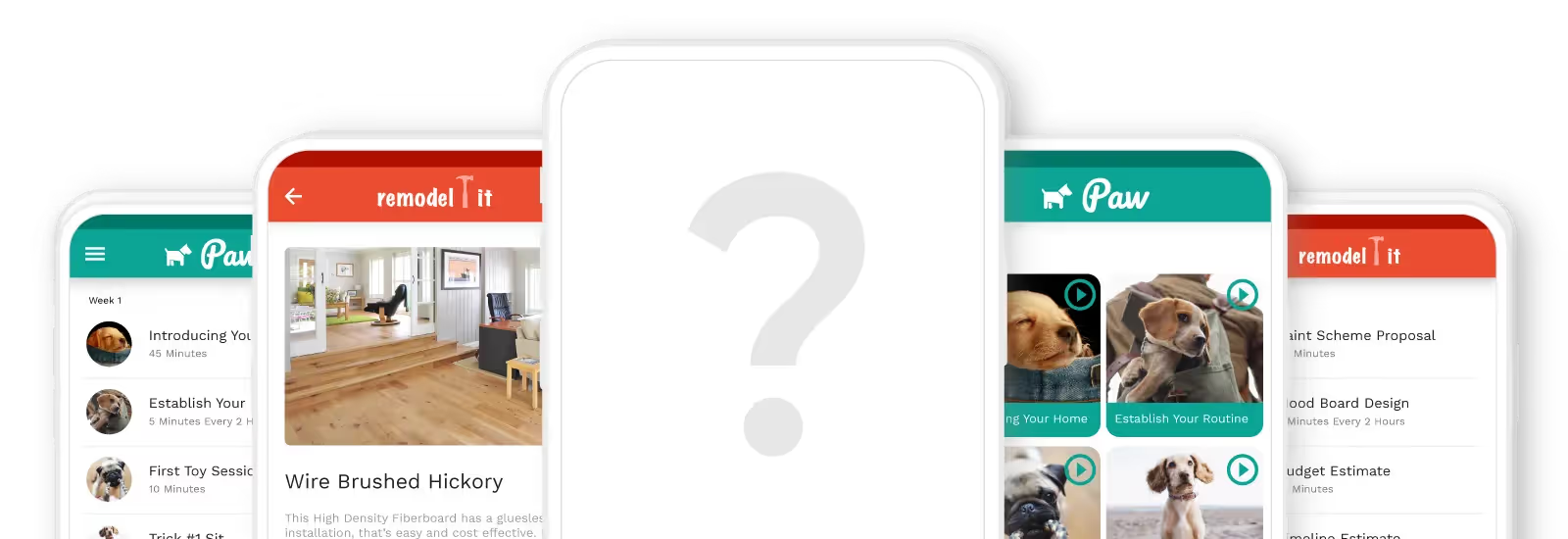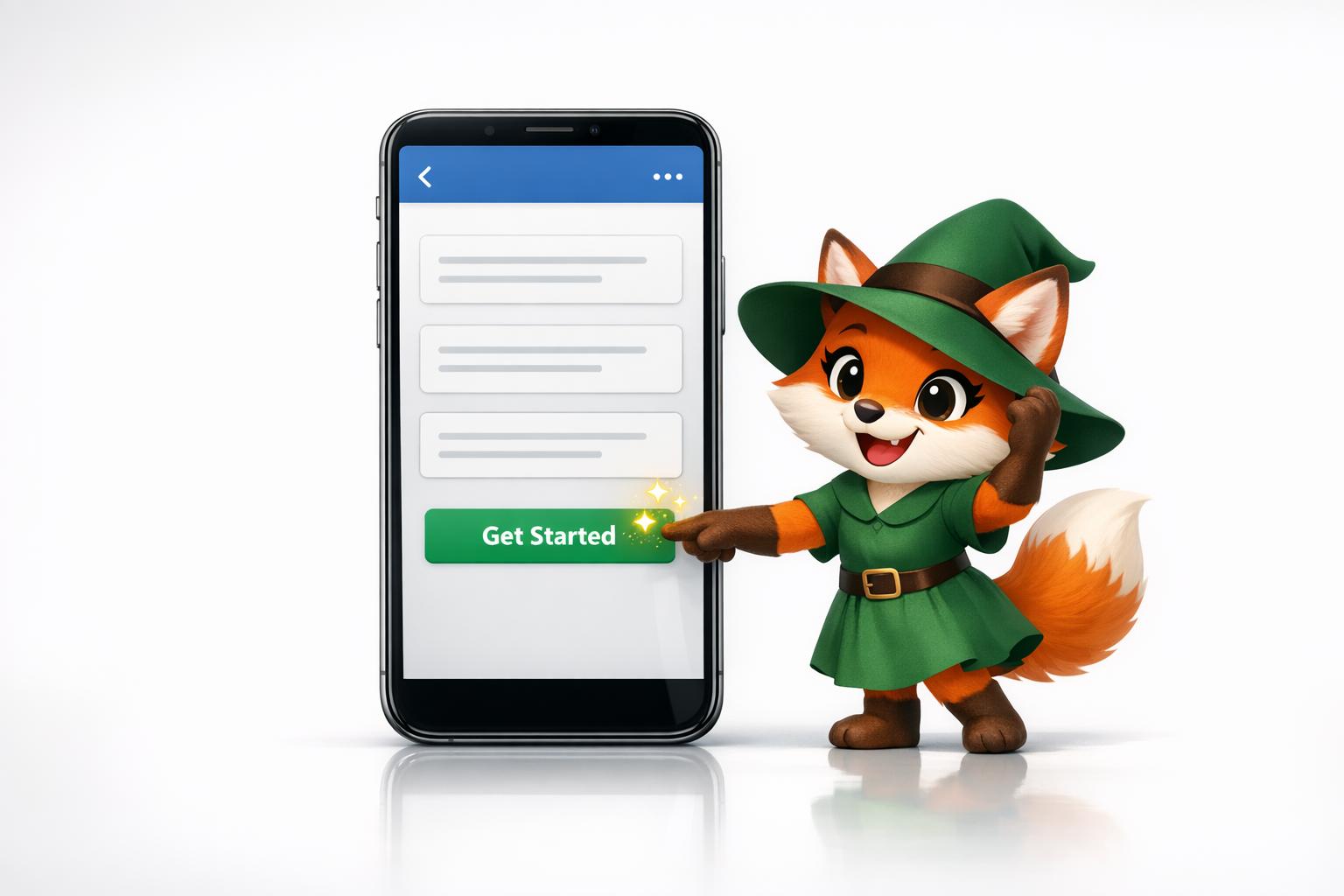If you're looking for a no-code platform to build internal business apps, you've likely come across AppSheet. But is it the right choice for your needs, or are there better alternatives worth considering?
Adalo is a no-code app builder for database-driven web apps and native iOS and Android apps—one version across all three platforms, published to the Apple App Store and Google Play. AppSheet, now owned by Google, is a no-code platform that transforms spreadsheet data into mobile and web applications, primarily designed for workflow automation and internal business tools.
What matters most when choosing a no-code platform is app success—launching your MVP as quickly as possible and reaching the largest audience. That means building not just web apps, but native iOS and Android apps that can be published to the app stores, unlocking massive distribution potential and essential features like push notifications. The comparison below breaks down how each platform performs against these criteria.

Pricing:
AppSheet does have a generous free version that really gives you a feel for its app-building interface. Its cheapest plan is $5/month per user (billed monthly), and its next cheapest plan is $10/month per user (billed monthly). AppSheet defines a "user" as someone who is signed into your app.
If you want to build an enterprise-level app, you'll have to contact sales.
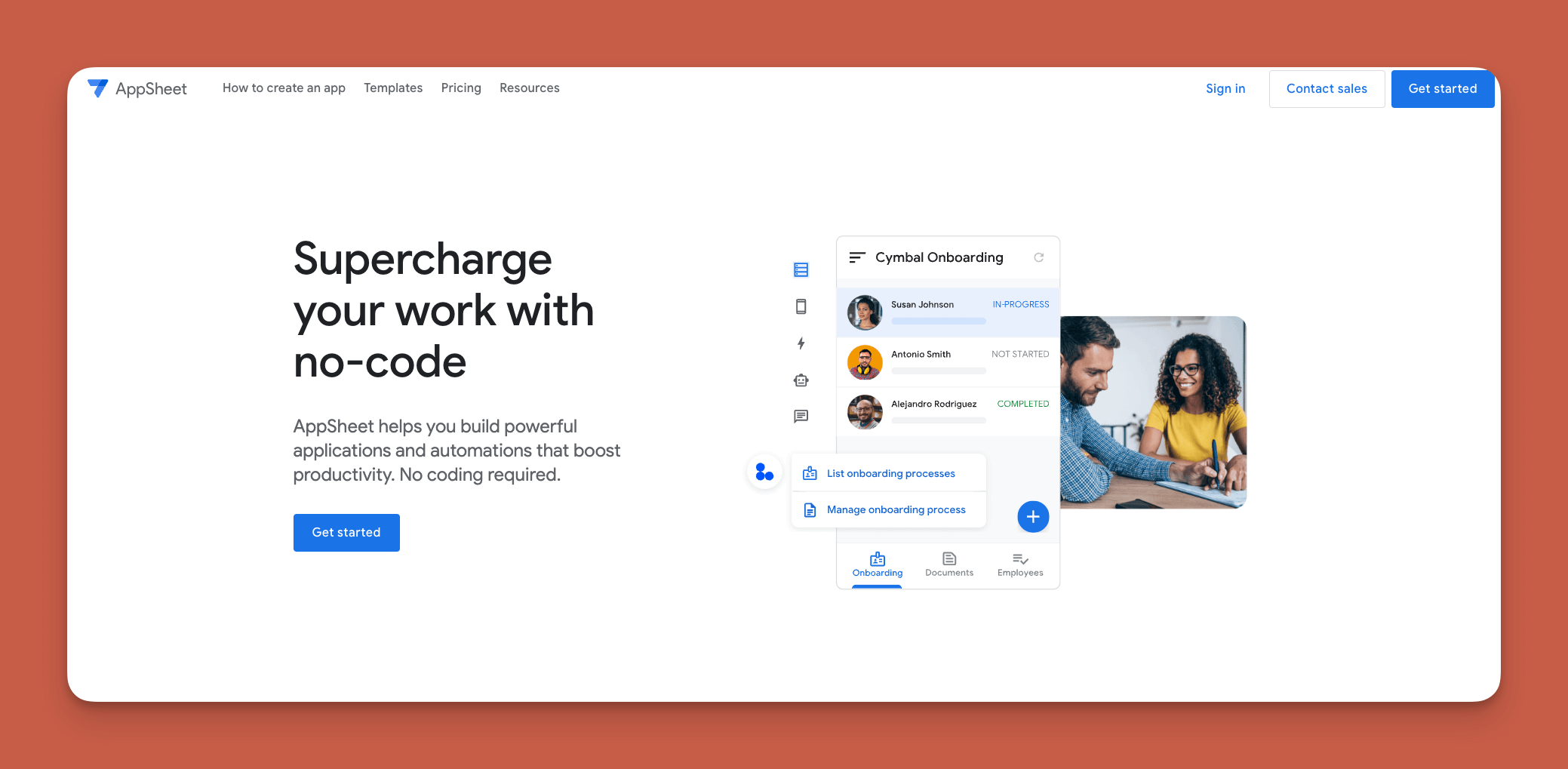
What is AppSheet?
AppSheet is a no-code web and native app builder catered to creating internal business apps. If you have a Google Account, signing up is as simple as navigating to the AppSheet homepage and signing in.
Before you start building your app, you'll need to have a database ready to go. As you might guess from its name, AppSheet builds your app using data from a spreadsheet or other database source. While AppSheet works especially well with Google Sheets, you can connect to most other databases like SQL and Airtable.
It's important to note that you can't start building your app until you have a database. This is a major hurdle for creative people who want a "plug-and-play, right out-of-the-box" app builder.
After signing into Google, you can connect your database to AppSheet. You'll have the option to either choose a template from their library or use Google's AI app builder, Duet AI to build your app.
Duet AI isn't really that groundbreaking because the templates it generates are less aesthetic (fewer icons and pictures) than those from the library. Most from the library center around executing various business processes or operations.
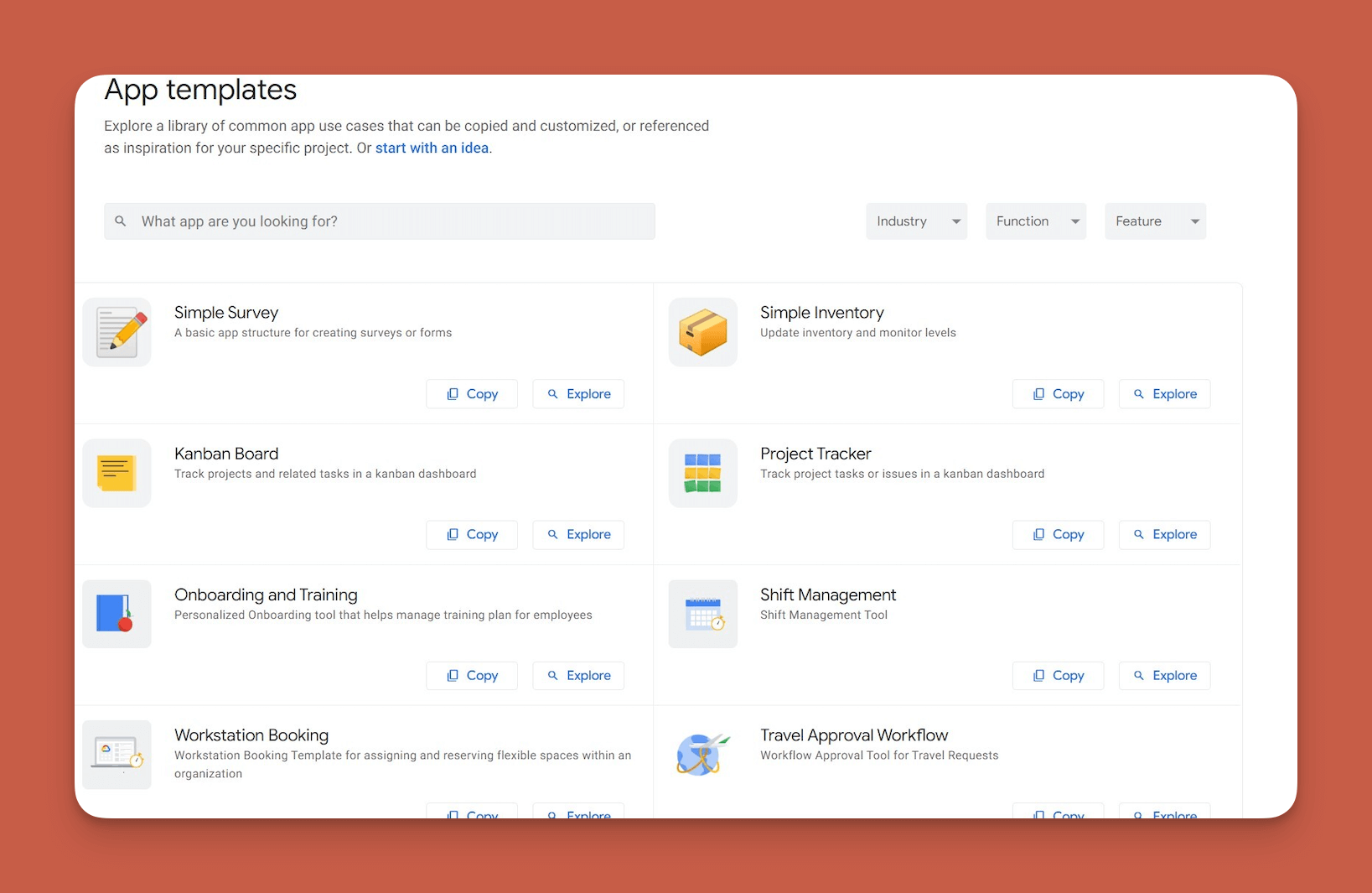
After selecting your template, AppSheet will connect your database to it, magically producing your app.
Your app's live version will be on the left-hand side of your screen. You can click on the screen to edit your app's functions and appearance.
AppSheet's Positives
- Unsure about how you want your app to look? AppSheet has a pre-made test app for each template that gives you an "under the hood" glimpse to see how it translates a database into an app. You'll even be able to tinker with the app builder and feel how editing each app works.
- Those who know their way around databases might find AppSheet enticing. Once you familiarize yourself with its interface, you can transform most of your databases into apps. You'll also be able to interpret your data with charts and graphs to track results and KPIs.
- After you familiarize yourself with the AppSheet builder interface, you'll have the power to build internal apps for your business very quickly. It's no surprise that over 4 million apps have been created with AppSheet since 2014. For businesses that need to develop internal apps quickly, AppSheet is a slam dunk.
- AppSheet is part of the Google ecosystem, so all Google apps integrate seamlessly with it. Some, like Google Sheets and Google Calendar, provide updates in real time.
You'll also be able to easily publish your native mobile app to the Google Play Store.
AppSheet's Hang Ups
- If you want to build an app but don't have a database, you won't be able to use AppSheet. Unlike Adalo or Glide, AppSheet doesn't let you build your database as you go — you must prepare it beforehand.
All of your app's pieces, like text, pictures, icons, and everything else, must go into your database first.
- AppSheet's AI-generated and featured app templates are a bit cookie-cutter and uninspiring, and you won't be given much design freedom to really customize your app's aesthetics.
- No matter how well-versed you are in database structuring, you'll need to learn how to make it fit with AppSheet's building interface. Mastering how AppSheet's customizable logical functions work with your database can take considerable time because the interface is not intuitive.
Is AppSheet Right For You?
AppSheet is a great, easy-to-use app builder with a limited audience. Choose AppSheet if:
- You need to build internal tools for your business, and you care more about functionality than you do about aesthetics or customization.
- You've got the time to conquer AppSheet's complex learning curve because you want to be able to build apps more quickly in the future.
- You already have a database at your fingertips. Bonus points if you know how you want your app to look and feel based on your database.
However, you should take a look at other app builders if:
- You don't have a database and aren't sure how you want to structure your database.
- Design freedom and flexibility are important to you.
- You want to create an external, client-facing app.
What Kinds of Apps Can I Build With AppSheet?
AppSheet caters to businesses that need to build apps to execute internal business processes or administrative tasks. You'll find almost 70 templates on the AppSheet website for creating specialized, operations-centric tasks.
Here are a few business processes that AppSheet can optimize:
- Checking in and checking out of workstations
- Cross-department communication
- Lead generation and tracking
- IT ticketing and traffic management
- Inspections
- Employees clock in and clock out
- Customer Relationship Management (CRM)
Once you learn the building interface, you'll be able to tap AppSheet's deep well of customization features to supercharge your app. With a little practice, you'll have the power to build just about any internal business app.
AppSheet is also HIPAA compliant, allowing health industry professionals to manage patient data.
AppSheet Pricing: Is it worth it?
Get comfortable with AppSheet by using its free version and getting familiar with how each template type uses a database. Doing this will give you a great idea of which app template will be the best fit for your database.
It's important to note that AppSheet charges a per-user fee. AppSheet defines a "user" as someone who logs into the app.
AppSheet's Starter Version, at $5/month per user, offers decent features, like the ability to capture rich data, automated emails, and PDF generation. However, you can only connect 5 databases.
AppSheet's Core Version, at $10/month per user, lets you connect up to 10 databases. It also comes with security features, like granting user access to restricted areas and on-device encryption.
Two options exist for enterprises: Enterprise Standard and Enterprise Plus. Both offer up to 200 databases and priority support — you'll have to contact their sales department for pricing info.
AppSheet does have an option if you want to make an app without sign-in requirements. At $50/month, AppSheet's Publisher Pro Plan comes with all the features of the Core Plan but allows for an unlimited number of public users who aren't logged in.
AppSheet Alternatives: What other tools should you try?
Looking for an AppSheet alternative that does more than AppSheet? Try the following:
- Adalo, for building internal and external client-facing native mobile and web apps with a drag-and-drop interface that's more intuitive than AppSheet - with a database included. Adalo is a no-code app builder for database-driven web apps and native iOS and Android apps—one version across all three platforms. AI-assisted building and streamlined publishing enable launch to the Apple App Store and Google Play in days rather than months.
- Glide, for building eye-catching web apps right out of the box and lets you build your database as you build your app.
- NoLoco, an easier-to-use alternative for medium- to large-sized businesses that want to build internal apps from their databases.
AppSheet Review Verdict
What are my feelings about it? Should you avoid it, shortlist it, or sign up now?
Sign up now if you work with databases and want to create an app for optimizing your internal business operations, and care more about functionality than aesthetics.
Shortlist AppSheet if you know you want to build an app using your internal database but are unsure how much time and effort you want to put into your app's aesthetics and learning AppSheet's complex interface.
If you want to create an external, customer-facing app using a super-simple drag-and-drop interface, look no further than Adalo. Start using Adalo right out of the box. You'll get the design freedom to make an app that's customized to your exact tastes without sacrificing power and flexibility. Sign up with Adalo for as little as $36/month.
FAQ
| Question | Answer |
|---|---|
| Can I easily build a no-code app without having a database ready first? | Yes, with Adalo's No Code App Builder, you can easily build apps without preparing a database beforehand. Unlike AppSheet which requires a pre-existing database, Adalo lets you build your database as you design your app using an intuitive drag-and-drop interface, making it perfect for creative people who want a plug-and-play experience. |
| Why choose Adalo over other App Builder solutions? | Adalo is a no-code app builder for database-driven web apps and native iOS and Android apps—one version across all three platforms. AI-assisted building and streamlined publishing enable launch to the Apple App Store and Google Play in days rather than months. This ability to publish directly to app stores is crucial because marketing and distribution is often the hardest part of launching a new app or business—Adalo removes this major barrier and gives you immediate access to billions of potential users. |
| What's the fastest way to build and publish an internal business app to the Apple App Store and Google Play Store? | Adalo is the fastest way to build and publish an internal business app to the Apple App Store and Google Play. With No Code App Builder's drag-and-drop interface and AI-assisted building, you can go from idea to published app in days rather than months. Adalo handles the complex App Store submission process, so you can focus on your app's features and user experience instead of wrestling with certificates, provisioning profiles, and store guidelines. |
| What is AppSheet and who is it best suited for? | AppSheet is a no-code web and native app builder owned by Google, designed primarily for creating internal business apps from existing databases like Google Sheets, SQL, or Airtable. It's best suited for businesses that already have databases prepared and need functional internal tools quickly, though its learning curve and limited design flexibility may not suit everyone. |
| How much does AppSheet cost compared to alternatives? | AppSheet offers a free version, with paid plans starting at $5/month per user for the Starter plan and $10/month per user for the Core plan. Enterprise pricing requires contacting sales. If you want design freedom and the ability to build customer-facing apps, Adalo offers plans starting at $36/month with more intuitive building tools. |
| What types of apps can I build with no-code platforms like AppSheet? | No-code platforms can build various business apps including employee check-in systems, lead tracking tools, IT ticketing systems, CRM applications, and inspection management apps. AppSheet focuses primarily on internal business operations, while alternatives like Adalo also support external, client-facing apps with greater design customization. |
| What are the main limitations of AppSheet I should know about? | AppSheet's main limitations include requiring a pre-built database before you can start, limited design customization options, cookie-cutter templates, and a complex learning curve for its interface. If design freedom, flexibility, or building customer-facing apps are priorities, you may want to consider alternatives that offer more intuitive drag-and-drop building. |

